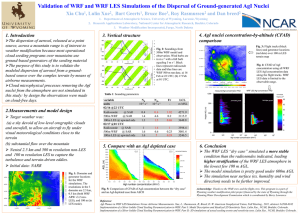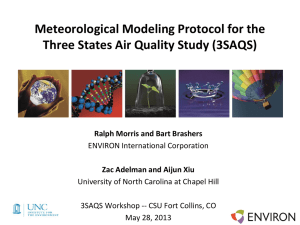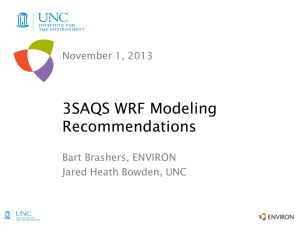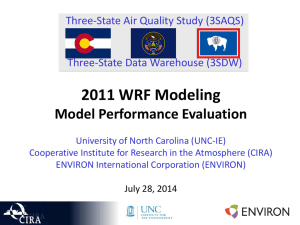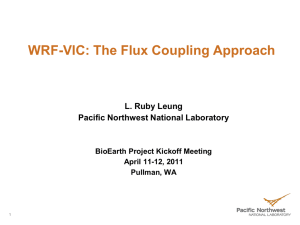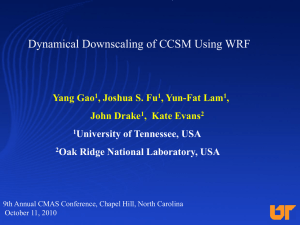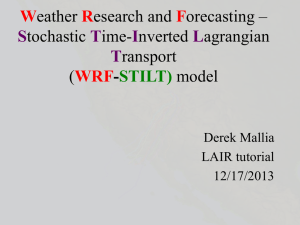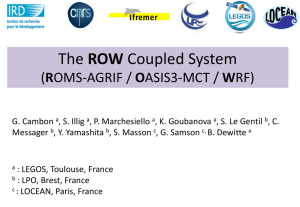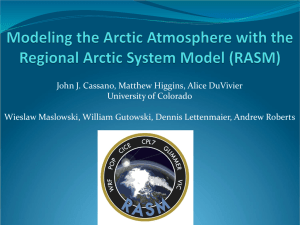WRF Real-Time Modeling in Antarctica Under AMPS
advertisement
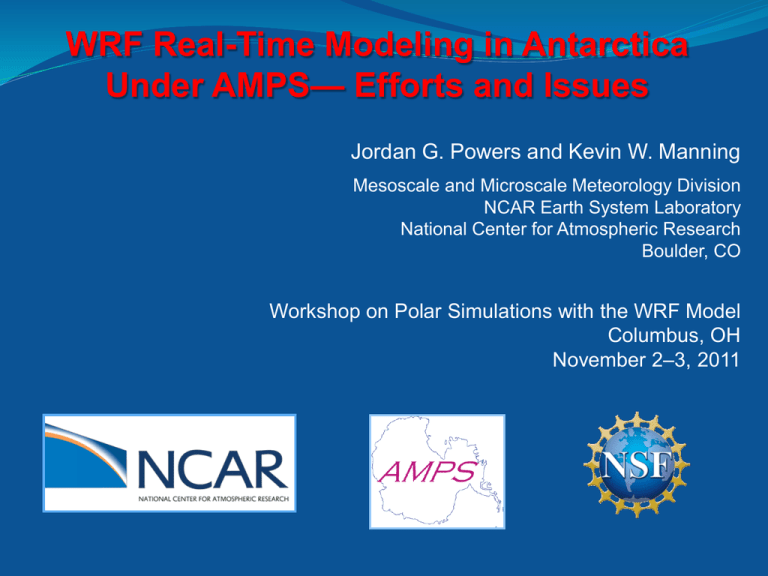
WRF Real-Time Modeling in Antarctica Under AMPS— Efforts and Issues Jordan G. Powers and Kevin W. Manning Mesoscale and Microscale Meteorology Division NCAR Earth System Laboratory National Center for Atmospheric Research Boulder, CO Workshop on Polar Simulations with the WRF Model Columbus, OH November 2–3, 2011 AMPS— The Antarctic Mesoscale Prediction System • Real-time WRF to support US Antarctic Program Antarctic weather forecasting and science • AMPS effort includes: (i) WRF polar performance analysis (ii) Physics improvement http://www.mmm.ucar.edu/rt/amps Motivations for AMPS: Antarctic Forecasting Needs – Weaknesses seen in the NWP available to the McMurdo forecasters (circa 2000) The Antarctic Weather Forecasting Workshop (May 2000, BPRC) 1) Inadequate resolution To capture mesoscale wx features To capture local topography 2) Need to improve high-latitude model performance Better physics/parameterizations needed for the Antarctic PBL / troposphere – Proposed: A real-time mesoscale modeling system tailored for the USAP forecasters AMPS WRF (Nov. 2011) 15 km Version 3.2.1 Western Ross Sea 5 km McMurdo NB: The official, released WRF has been “Polar” since WRF V3.1, April ‘09 South Pole 5 km 6 Grids: 45-, 15-, 5-, 1.67-km 45 km ●● 5 km Christchurch (CHC) Antarctic Peninsula Primary air route: CHC–MCM 15 km 1.67 km McMurdo Station ● (MCM) ● ● Topography shaded Ross Is. ● ● South Pole Palmer Station McMurdo AMPS WRF Configuration Fcsts Top: 10 mb 45 km— 120 h 15 km— 120 h 5 km— 36 h 1.67 km— 36 h Levels (η): 44 Lowest ½-η: 12 m AGL Physics LSM: Noah (w/ latest polar mods) PBL: MYJ scheme Microphys: WSM 5-class Sfc layer: Eta scheme Cu: Kain-Fritsch: 45-km,15-km Fully-explicit: 5-km, 1.67-km LW rad: RRTMG SW rad: Goddard Sea ice: Fractional representation Sea ice analyses: Nat’l Snow & Ice Data Center AMPS Plans for WRF Improvement Goal: Improve WRF for Antarctica through polar modifications and model evaluation 1) Base AMPS Effort a) Investigation of forecast clouds – Evaluation of WRF microphysics to identify best performance for Antarctic conditions b) Stable boundary layer performance – Comparison of MYNN PBL scheme with MYJ scheme in stable conditions in Antarctica AMPS Plans for WRF Improvement (cont’d) 2) NSF OCI (Ofc of Cyberinfrastructure)– Supplemental Effort a) Review, revise the organization of polar mods within WRF – Shift ice-related mods from Noah to separate module b) Prepare the revised code for next WRF release – Spring 2012 c) Investigate new polar capabilities ▪ Variable sea ice thickness ▪ Variable snow depth on sea ice ▪ Variable sea ice albedo Real-Time WRF over Antarctica: Problems Encountered 1) Stability • WRF blow-ups – Most often seen over Antarctic Peninsula in winter – Assoc’d with: Strong winds over steep terrain – WRF config adjustments Shortened Δt Increased w damping and depth of damping layer • WRFDA Analysis – Problems with Var failing or producing bad analyses Real-Time WRF over Antarctica: Problems Encountered (cont’d) – Variational bias correction (VBC) bug: Use of AMSU-A radiances w/ VBC 70 ms-1 WRFDA Input Min= 0 Max= 85 Wind speed (ms-1) 250 ms-1 WRFDA Output Min= 0 Max= 270 Level: η1/2= 5 (approx. 25 mb) Real-Time WRF over Antarctica: Problems Encountered (cont’d) 2) Performance – Wind speed low bias in high-wind events McMurdo (E.g., May ‘04, Nov. ‘07, Apr. ‘09, Nov. ‘09) – Warm sfc T biases in AMPS over Plateau ▪ Coastal sites, Ross Ice Shelf, West Antarctica show varying warm / cold biases ▪ Original, larger warm bias reduced in AMPS with cycling of subsurface temps from WRF (cf. GFS input) Real-Time WRF over Antarctica: Problems Encountered (cont’d) – Warm sfc T biases in AMPS over Plateau Obs WRF Obs WRF Bias RMSE (°C) Fcst hr Winter (Apr.–Jul. ‘11) Bias RMSE (°C) Fcst hr Summer (Nov. ‘10-Jan. ‘11) Real-Time WRF over Antarctica: Problems Encountered (cont’d) – Forecast cloud bias ▪ Lower-than-obsv’d cover over the Southern Ocean (Nicolas and Bromwich 2011) ▪ Q: What are impacts on incoming/outgoing radiation? Monthly Mean Cloud Fraction Feb. 2011 (from Nicolas and Bromwich 2011) AMPS CloudSat / CALIPSO satellites Re: Road to Improvement of WRF in AMPS • Latest versions of WRF do not always immediately improve things – Verification for warm and cold seasons in AMPS done before implementation • Polar modification gains: Incremental, but steady • Forecast improvements from assimilation of new data types individually small – Large error reductions not seen as individual new obs types added: Small positive impacts – Note: GFS first-guess in AMPS reflects prior DA Advancing WRF for Polar Simulations: Possibilities 1) Restructuring of Current Polar Mods (Noah LSM) – Revision effort in progress under AMPS 2) Subsurface Initialization (esp. for Antarctica) – What different approaches are taken? – Is there a best approach? (Approach may depend on the first guess) 3) Sea-ice Model Coupling – Goal: Improved sea-ice treatment and evolution Advancing WRF for Polar Simulations: Possibilities (cont’d) 4) Ocean Model Coupling – How much need for high-latitude WRF? 5) Improved High-latitude Cloud Representation Ex: WRF low bias over Southern Ocean 6) Radiation scheme improvements Ex: Modified RRTM longwave scheme – What are the current deficiencies? Advancing WRF for Polar Simulations: Possibilities (cont’d) 7) Blowing Snow Parameterization – What are the possibilities? Coupled snow model? 8) Diamond Dust / Clear-sky Precip – Significant source of pcp over Antarctic plateau – Development of parameterization or forecast algorithm possible? On Needs for WRF for High-Latitude Applications • What are the need areas for WRF polar improvement? – Can comprehensive list be compiled? – Identification of 2–3 most pressing areas – Better simulation of certain meteorological conditions? (e.g., fog, stable PBL, polar clouds) – Reduction of specific forecast errors? • What WRF physics areas easiest to improve for low-cost model advancement (i.e., low-hanging fruit)? • Are there WRF deficiencies seen at one pole and not the other?
